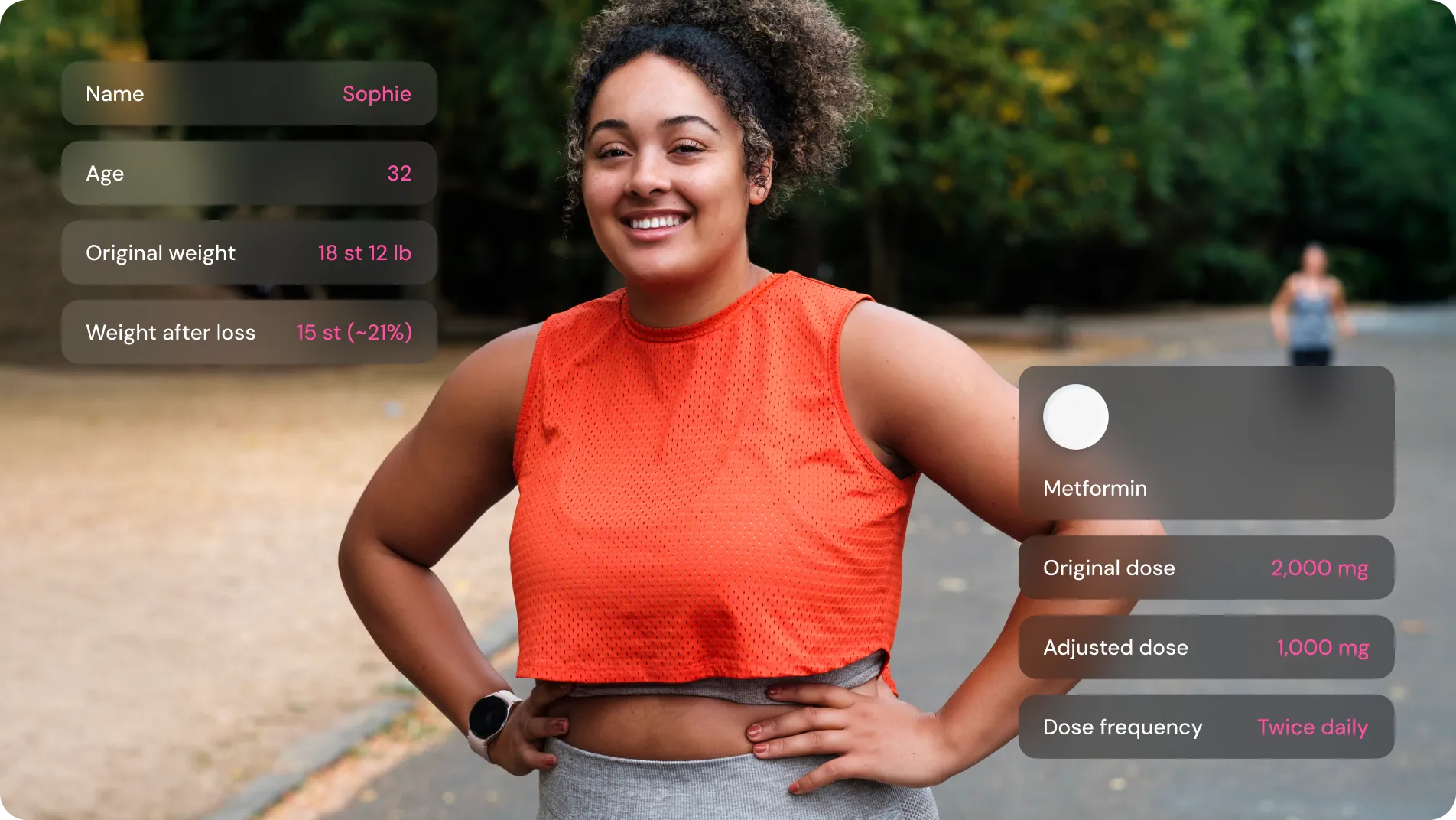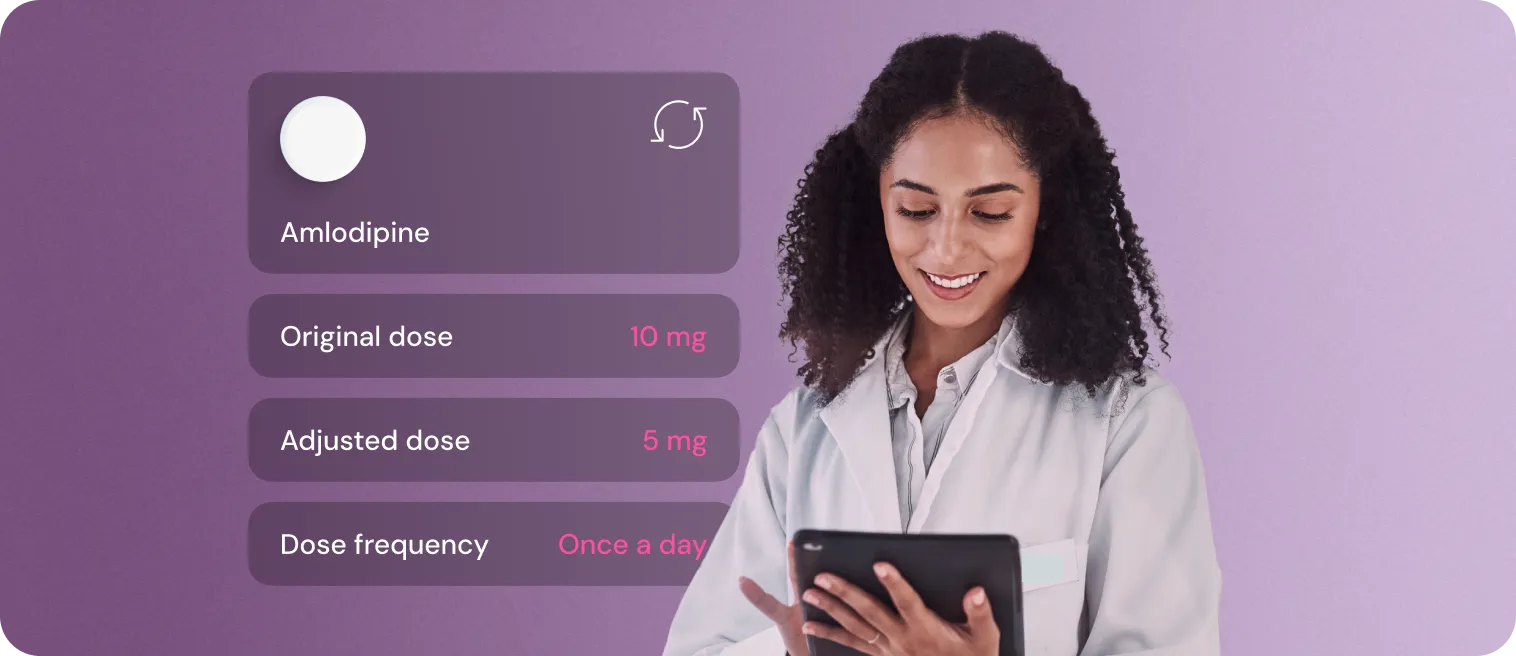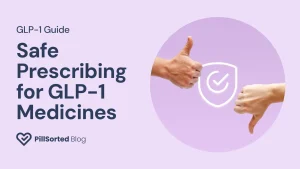Your Guide to Optimising Your Medication as You Lose Weight

When your health changes, your medicines should too, especially if you’re living with more than one long-term condition. That’s where medication optimisation comes in.
Whether you’ve started a new treatment like a GLP-1 injectable (such as Mounjaro or Wegovy) or you are making lifestyle changes that lead to weight loss, it’s important to know that your current prescriptions might need adjusting.
In fact, losing just 5% of your weight may impact how your body processes certain medicines, meaning you may need lower doses, different medications, or fewer altogether. The logic is simple, but the consequences of not adjusting your treatment can be serious, ranging from uncomfortable side effects to potentially dangerous complications.
That’s why we’ve put together this guide to optimising your medication as you lose weight. Whether you’re just starting your journey or already seeing progress, we’ll walk you through what to watch out for, how pharmacists can help and the steps you can take to stay safe and well as your health evolves.
In this post:
- Why medicines aren’t ‘one size fits all’
- What comorbidity means and how it affects your medication
- How medication optimisation works
- Risks of overmedication after weight loss
- What you can do as a patient
- How PillSorted supports you
- FAQs about weight loss and medication changes
Why medication isn’t ‘one size fits all’
When your GP first prescribes a medicine, for example, to treat high blood pressure, or type 2 diabetes, they take into account things like your weight, your current test results and how your body processes medication. But your body isn’t static. If you lose weight, especially a significant amount (10kg or more), the same dose that once helped manage your condition may now be too strong and increase your risk of side effects.
As one of our PillSorted pharmacists, Shamir, puts it:
“When you lose weight, there’s less of you — so you may need less medicine to get the same effect.”
What is comorbidity?
Comorbidity is the clinical term that refers to the presence of two or more chronic health conditions at the same time.
For example, someone living with obesity may also have type 2 diabetes, high blood pressure, Heart problems, Sleep Apnea or arthritis. These conditions don’t exist in isolation. They often influence one another and the medications used to treat them can interact in complex ways.
Living with comorbidity often means managing multiple medications, also known as polypharmacy. As your health improves — particularly if you’re losing weight you may find that some of these medications are no longer needed or need to be adjusted. That’s where regular medication reviews become crucial.
How medication optimisation works
Optimising your medication means making sure:
- You’re on the lowest effective dose
- You’re taking only the medicines you need
- Your treatment fits your current health status, not just your history
At PillSorted, our NHS-accredited pharmacists monitor your prescriptions over time. If we notice changes — such as if you start a new medication like a GLP-1 or report a recent weight loss — we can help flag this to your GP and suggest tests and medication review. This is especially important for people using weight loss injectables, which can significantly improve blood sugar control, blood pressure, Inflammatory markers and cholesterol levels.
According to the National Institute for Care Excellence (NICE), proper medicines optimisation improves health outcomes, reduces hospital admissions and ensures safer care, especially in people with comorbidities.

Risks of overmedication
What could happen if your medication isn’t adjusted? If you continue taking the same dose after losing weight, you may be more likely to experience:
- Light-headedness or fainting (from low blood pressure)
- Hypoglycaemia (from low blood sugar)
- Weakness, fatigue, or confusion
- Poor treatment outcomes over time
These side effects are often misunderstood or misattributed, when in fact the root cause is simple: your medicines need to be adjusted to fit your healthier body.
What can you do as a patient?
If you’ve lost weight — whether through medication, lifestyle changes, or a combination of both — there are a few things you can do to protect your health:
- Keep track of your weight and symptoms, especially if you notice fatigue, dizziness, or blood sugar changes
- Talk to your pharmacist if you’ve lost 5 kg or more, or started a GLP-1
- Don’t stop or reduce your medication on your own — some medicines need to be tapered gradually
- Ask for a medication review if anything feels off or if you’re managing more than one condition. You can book a review with Pillsorted here.
How PillSorted supports medication optimisation
We’re not just here to deliver your prescriptions, we’re here to help you stay well.
With PillSorted, you can:
- Get reminders so you don’t miss a dose
- Contact our pharmacists anytime with questions or concerns
- Receive medicines tailored to your current needs
- Rely on us to coordinate with your GP if a change is needed
Whether you’re managing obesity, high blood pressure, or other long-term conditions, we’re here to support you in optimising your medicines safely and confidently.
Main takeaways
- Optimising your medication as you lose weight is essential to avoid side effects and maintain safe treatment.
- People with comorbidities and multiple medications are especially at risk of overmedication as their health improves.
- Pharmacists play a key role in monitoring and adjusting your prescriptions.
- At PillSorted, we offer proactive, patient-centred care that adapts as your needs change.
FAQs
Do I need to tell someone if I’m losing weight while on medication?
Yes. If you’re taking medication for blood pressure, diabetes, or cholesterol and you’ve lost weight (especially 5kg or more), let your pharmacist or GP know. Your dose may need adjusting.
What’s the risk of continuing the same dose after weight loss?
Your medicine may become too strong for your body, leading to side effects like dizziness, low blood sugar, or fainting. Regular reviews help prevent this.
Can PillSorted pharmacists help with medication reviews?
Absolutely. We’re trained in medicines optimisation and can flag when a review might be helpful. We’ll work with your GP to support any changes needed.
Is it safe to reduce or stop medicine on my own?
No. Always speak to a pharmacist or GP first. Some medicines need to be tapered slowly, and stopping suddenly can be harmful.
References
- Diabetes UK (2025). Weight Loss and Diabetes
- NICE (2015). Medicines optimisation: the safe and effective use of medicines to enable the best possible outcomes
- NIH (2024). Drug-induced low blood sugar
PillSorted
If you’ve recently started a weight loss treatment, noticed a change in your health, or just want to make sure your medicines are still right for you, we’re here to help.
Call us at 033 4050380 or email help@pillsorted.com.

All third-party trademarks (including logos and icons) referenced by PillSorted remain the property of their respective owners. Unless specifically identified as such, PillSorted’s use of third party trademarks does not indicate or imply any relationship, sponsorship or endorsement between PillSorted and the owners of these trademarks.






























